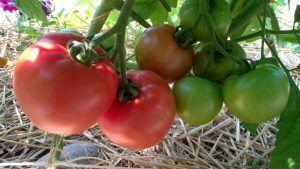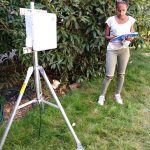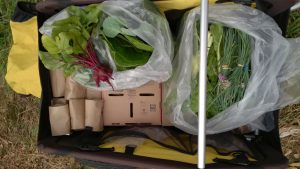What’s in the Air is Fair
January 12, 2019
Is it risky to eat food grown next to the Freeway? Orchard visitors sometimes ask this question.  It is an especially interesting question to me, an Environmental Protection Agency retiree and air quality specialist.
It is an especially interesting question to me, an Environmental Protection Agency retiree and air quality specialist.
The two principle ways food can become contaminated from environmental pollutants are through soil and air. In urban areas, lead is the soil pollutant of greatest concern. In 2010, before we started growing food at Freeway Estates, we tested the soil and found low lead levels (13 ppm).
 How bad is our air? Even though levels of fine particulate pollution have risen in recent summers because of wild fire smoke, Seattle’s air quality is better than most major cities in the United States. Still, I questioned whether air quality at the orchard, with its proximity to I-5, is worse than other places in Seattle. A recent University of Washington study on neighborhood-scale air quality offered a partial answer. When Justin sent us an email about this study, I quickly volunteered my yard, located one block from the orchard. Technicians from UW placed an air quality monitor in our yard in the summer of 2017 and spring of 2018. The 2017 monitoring included a period of high wild fire smoke. The machine measured particulate matter, nitrogen dioxide, ozone, and carbon monoxide. Levels found in our yard were not high compared to levels found elsewhere in Seattle.
How bad is our air? Even though levels of fine particulate pollution have risen in recent summers because of wild fire smoke, Seattle’s air quality is better than most major cities in the United States. Still, I questioned whether air quality at the orchard, with its proximity to I-5, is worse than other places in Seattle. A recent University of Washington study on neighborhood-scale air quality offered a partial answer. When Justin sent us an email about this study, I quickly volunteered my yard, located one block from the orchard. Technicians from UW placed an air quality monitor in our yard in the summer of 2017 and spring of 2018. The 2017 monitoring included a period of high wild fire smoke. The machine measured particulate matter, nitrogen dioxide, ozone, and carbon monoxide. Levels found in our yard were not high compared to levels found elsewhere in Seattle.
Sat Feb 16, 1-3, Tree Pruning Class
Sun Feb 17, 2-4, Work Party
Sun Mar 17, 2-4, Work Party
But, can fruits and vegetables absorb air contaminants? I have found little research on this question. A 2017 study in Sao Paulo Brazil looked at polycyclic aromatic hydrocarbons (PAHs), a ubiquitous air pollutant from the burning of fossil fuels and biomass. The study found no significant PAH concentrations in spinach and collard greens grown in the presence of high levels of PAH. It seems possible, however, that air contaminants can settle on the surface of garden produce and become available to us if we eat them without washing. So, it’s a good idea to wash even organically grown fruits and  vegetables.
vegetables.
While I did not find evidence that we consume air pollutants when we eat food grown in urban gardens, there is plenty of evidence that consuming fruits and vegetables is good for our health. In fact, the antioxidants and other phytochemicals in fresh produce may help protect us from the harmful effects of air pollution. So, I’ll continue to enjoy the super-fresh produce from our FECO garden plot, appreciating the healthful properties and great taste – after I wash them.
Nancy

Right on, Nancy! Excellent post!
Well written – and glad you addressed this concern. I worry about picking blackberries growing wild next to high-traffic areas, and sound like I just need to wash well.
So glad to have this info. Thanks a lot Nancy! Way to go.
Kurt Liebert
6043 6th Ave NE
Seattle, WA 98115